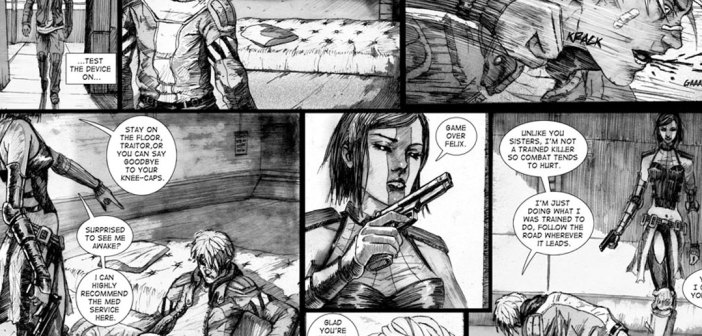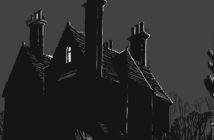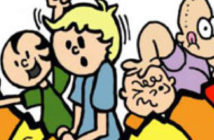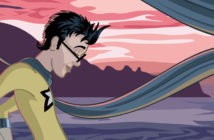A persistent question ran through my head as I read Edward Sharam’s Road: Why am I reading this comic as a digital Zuda entry and not as a published book? It’s certainly a work that deserves to be bound and stocked on retail bookshelves everywhere, as Sharam’s title is a breath of fresh air. Engaging excitement leaps off the page with every turn, managing to impress me with both the story’s ingenious creativity as well as its ability to remind me of the great dystopian tales I cherish, such as the film, Children of Men, and China Miéville’s novel, Perdido Street Station.
The story of Road follows the travels of Felix, a renegade who has severed ties with the Pilgrims of the Road, a religious group devoted to traveling the “Road,” a literal path that spans the face of the planet with no end in sight. The Pilgrims have made it their self-appointed duty to travel the Road to its unknown end, in the hopes of uncovering its powerful secrets. But Felix is suspicious of the Pilgrims true agenda, and upon his departure from the order he becomes a marked man, wanted dead or alive so that an A.I. device implanted in his skull (granting him access to the knowledge of his Pilgrim ancestors) may be retrieved for the Pilgrims own schemes.
To hunt Felix down, several agents are dispatched by the Elder of the Pilgrims of the Road, a dusty old priest who wanders the halls of the order’s stronghold, the Chapterhouse. But it’s not just the Elder who’s interested in finding Felix: the Sisterhood, an organization of futuristic warrior women, will stop at nothing to capture the young hero, all under the command of the tantalizing femme fatale, Mother Superior.
The greatest strength of Road is the atmospheric tone of the story, which is established from the beginning of page one. This is owed in large part to Sharam’s phenomenal artwork, an illustrated tapestry of shaded grays that frame the dystopian science fiction world we as the readers are being invited to step into. The level of detail paid not only to the unique cast of characters, but to the exceptional industrial settings is nothing short of jaw-dropping, and Sharam deserves only praise for the level of attention and care he showers on his craft.
As the plot of Road progresses, a plethora of intriguing characters are introduced. Among them is Sister Miah, a skilled warrior who shares a troubled relationship of violence and intrigue with Felix. Embodied in Miah is Sharam’s sly use of female figures: they’re sexy, but not pinup objects; they’re strong, but not disconcerting. The same can be said for Miah’s leader, the Mother Superior, who’s a highly original figure detailed with numerous complex facets. She’s certainly sultry, but she’s also donning cybernetic limbs and has ritualistic scars carved into her flesh. She speaks with the tone of a messianic madwoman, but sports the mind of a cunning tactician. My hat goes off to both Sharam and his co-writer, Jamie Woodhead, for their strong cast of interesting female characters.
A clear undercurrent of inspiration is laced throughout Road, calling up memories of the dystopian Children of Men and the cyber-punk Blade Runner. And much like the latter, the weakness of Road is its plot development from time to time. Certain occurrences come off as rushed and jarring, such as when Felix and Miah break a prisoner out of the Orphans’ lair, which raises another question: Who exactly are the Orphans? They clearly oppose the Pilgrims and the Sisterhood, but I wasn’t able to figure out much more than that about their importance. I’m sure the entire story of Road is crystal clear in Sharam’s mind, but at times that clarity doesn’t transfer to the final product.
But the few troubles I have with Road may be unwarranted, as the book is still a work in progress, updated every Monday with a new page on the Zuda Web site. And regardless of my complaints, the pros of Road certainly outweigh the cons. The story has all of the right ingredients for a great comic: originality, action, memorable characters, amazing artwork, strong atmospherics, and a hunger to know what will happen next. And there’s no reason not to check out the book, as it’s available to read at no charge on ZudaComics.com. It’s definitely worth taking a look at and following along with as time unfolds. Sharam deserves credit for this creation of his—I just hope it pays off in the future, preferably in the form of a publishing deal. Road would look great as a digest-sized book, after all. It’s just a suggestion.
This comic book review originally appeared on Broken Frontier on 31 October 2009.




